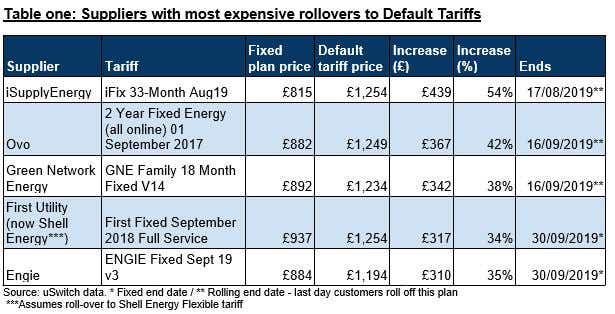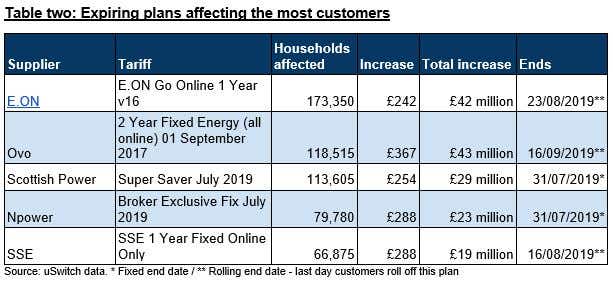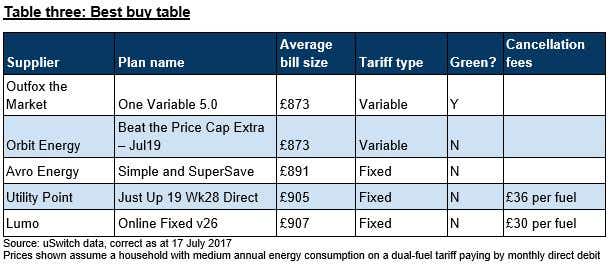£426 million energy bill increase as slew of tariffs end
276 fixed price energy deals from 37 suppliers end between July and September
Bills for 1.6 million households will go up by £426 million if they don’t switch
The average increase is £269, but some customers could see price hikes of £439 (54%) if they roll onto costly Standard Variable Tariffs (SVTs)
Price cap changes in April drove the cost of SVTs as high as £1,254 per year
Uswitch.com urges consumers to lock in cheaper prices before the summer holidays – in just minutes they could switch to a better deal and save up to £447.
Millions of households could see their energy bills rocket by as much as £439 (54%) as hundreds of fixed price deals come to an end in July, August and September, according to new data from Uswitch.com, the price comparison and switching service.
Customers who don’t move to a cheaper deal will be automatically rolled onto default Standard Variable Tariffs, which are typically among the worst value energy plans. The average increase will be £269 per household, but those supplied by iSupply, Ovo and Green Network Energy will see even greater hikes of £439, £367 and £342 respectively.
276 expiring tariffs from 37 suppliers will add £426 million to the energy bills of approximately 1.6 million households. Many of those affected are likely to have chosen their fixed deal last summer, when 13 price rises in the space of three months added an average of £71 to the bills of over nine million energy customers. This prompted 1.5 million consumers to switch provider between July and September 2018, to avoid the hit to their wallets.
44 energy companies have already raised the cost of their Standard Variable Tariff by up to 17% this year, following Ofgem’s decision to raise the level of the energy price cap in April. The cap sets an upper limit for default tariffs, which are usually among the most expensive on the market.
Ofgem is expected to announce that the price cap will decrease by around £80 next month, but this lower rate won’t take effect until 1 October. And even when the cap is reduced, those energy customers on default tariffs could still be overpaying by around £300 a year.
Consumers don’t have to sit back and accept these bill hikes. Ofgem rules allow customers to switch suppliers without paying exit fees 49 days before their plan ends, so households affected can switch and save now without worrying about charges for leaving early.
Rik Smith, energy expert at Uswitch.com, says: “Energy bills might not be front of mind just as everyone is about to head off on their summer holidays. But over one and a half million households could be in for a nasty shock when they get home if they don’t act now.
“There was more than one price rise a week during 2018, and many of those who switched to escape the onslaught then are now seeing their fixed price plans coming to an end. It’s time to take action to avoid being rolled onto an expensive standard tariff. People who switch to a fixed deal this time should also sign up for a reminder to alert them when their plan is next due to expire – to keep you firmly in control of who you give your hard-earned money to.
“Although the price cap is set to reduce the maximum cost of standard tariffs in the next few months, customers on default plans could still be paying up to £300 more each year compared to those who choose to shop around. That’s enough to get to Miami and back this summer – which is far more exciting than handing the money over to an energy company.”



FOR MORE INFORMATION
Tim Dunford
Phone: 020 3872 5612
Mobile: 07785 552666
Email: tim.dunford@uswitch.com
Twitter: @uswitchPR
Notes to editors
Source: Uswitch data. 163 ‘fixed end date’ and 113 ‘rolling end date’ fixed price energy plans will expire between 1 July - 30 September 2019.
Source: Uswitch data. Total bill increase (£426,293,380) calculated by multiplying the increase per tariff by the number of households affected. Average increase per household is £426,293,380 (total tariff increase) divided by 1,585,600 (total households affected) = £268.85 per household.
Between 1 July 2018 and 31 Dec 2018, at least 10% of people who switched energy supplier for both gas & electricity with Uswitch saved £447 or more.
See Table 1 in body of press release. All tariffs are dual fuel, paying by direct debit on Ofgem medium consumption
Source: Uswitch data
Source: Energy-UK
Ofgem rules on switching when fixed deal is coming to an end
Source: Skyscanner.net. Price correct as of 16 July 2019. Based on one adult return fare, flying economy from London Heathrow to Miami International Airport on 18/9/19 and returning on 30/9/19.
About us
It’s all about “U”!
Thank you for indulging us over the last 20 years by using a small ‘u’ and a big ‘S’ when writing about our brand in your articles.
We are delighted to let you know that you are now off the hook - it’s big U’s all the way (and small s’s) as we undertake our biggest ever rebrand - so let your autocorrect go wild!
About Uswitch
Uswitch is the UK’s top comparison website for home services switching. Launched in September 2000, we help consumers save money on their gas, electricity, broadband, mobile, TV, and financial services products and get more of what matters to them. Last year we saved consumers over £373 million on their energy bills alone.
Uswitch is part of RVU, a new business that also owns Money.co.uk and Bankrate.
If you would no longer like to receive our press releases please email prteam@uswitch.com with 'unsubscribe'.
